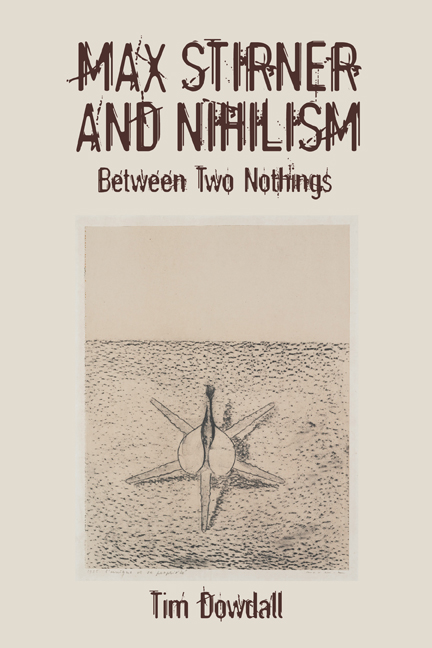Book contents
- Frontmatter
- Dedication
- Contents
- Acknowledgments
- Notes on Sources, Abbreviations, Translations, and Spelling
- Introduction: Stirner: Sinner or Saint?
- Chapter 1 The Origins of Disrepute: Stirner in Context
- Chapter 2 The Meaning of Nothing: Nihilism’s Complex Etymology
- Chapter 3 The Tragic Age for Europe: Nihilism from Nietzsche to Now
- Chapter 4 The Use and Abuse of Nihilism: Stirner under Fire
- Chapter 5 The State of Denial: Stirner and Political Nihilism
- Chapter 6 The Absence of Absolutes: Stirner and Moral Nihilism
- Chapter 7 The Fear of Nothing: Stirner and Existential Nihilism
- Conclusion: Stirner: The Happy Nihilist?
- Bibliography
- Index
Chapter 3 - The Tragic Age for Europe: Nihilism from Nietzsche to Now
Published online by Cambridge University Press: 09 May 2024
- Frontmatter
- Dedication
- Contents
- Acknowledgments
- Notes on Sources, Abbreviations, Translations, and Spelling
- Introduction: Stirner: Sinner or Saint?
- Chapter 1 The Origins of Disrepute: Stirner in Context
- Chapter 2 The Meaning of Nothing: Nihilism’s Complex Etymology
- Chapter 3 The Tragic Age for Europe: Nihilism from Nietzsche to Now
- Chapter 4 The Use and Abuse of Nihilism: Stirner under Fire
- Chapter 5 The State of Denial: Stirner and Political Nihilism
- Chapter 6 The Absence of Absolutes: Stirner and Moral Nihilism
- Chapter 7 The Fear of Nothing: Stirner and Existential Nihilism
- Conclusion: Stirner: The Happy Nihilist?
- Bibliography
- Index
Summary
Nietzsche's Uncanny Guest
In order to understand the relevance of nihilism to Stirner's thought, there is no more important definition of the term than the one fashioned by Friedrich Nietzsche (1844–1900) in the course of his last nine years of lucidity, from 1880 to 1889. In the nearly two and a half centuries of nihilism's semantic evolution up to the present day, Nietzsche plays the pivotal role; the concept of nihilism that bears his name has colored, to a greater or lesser degree, all but the first fifty years of the discussion around Stirner and nihilism. Nietzsche took a word that had recently undergone rapid development, both in its prevalence and complexity, and transformed it into a radical new concept that encapsulated the crisis of Western modernity. Ever since, the common perception of nihilism has been based to a large extent on Nietzsche's diagnosis, not least because of the extraordinary influence he has had on subsequent generations of thinkers, artists, and writers. As Gillespie says: “When it comes to our understanding of nihilism, we are almost all Nietzscheans.”
It is, in a sense, Stirner's misfortune to have been so closely linked to Nietzsche at the time of the decisive, so-called first Stirner renaissance, which was largely brought about by the coincidence of three events: firstly, Hartmann's attack on Nietzsche in 1891 (discussed in more detail below), in which he employed Stirner as a weapon; secondly, the publication of Lauterbach's new edition of Der Einzige in 1893 in Reclam's low-priced, high-circulation Universal-Bibliothek, where he compares the two philosophers in his short introduction; and, thirdly, Nietzsche's meteoric rise to fame in the last decade of the nineteenth century, which inadvertently shone a light on Stirner. One of the abiding outcomes of this concurrence is the assumption that Nietzsche's thought and Stirner's share characteristics and concerns, including those relating to nihilism, a belief that is reinforced by apparent similarities in their writings.
The question that arises from this supposed association is not simply whether there is a fundamental similarity between Nietzschean nihilism and Stirner's thought, but whether such an affinity derives from Nietzsche having known Stirner's writings, and then used, or even plagiarized, them as a component in or an inspiration for his description of the sinister cultural condition that he believed to be engulfing European civilization.
- Type
- Chapter
- Information
- Max Stirner and NihilismBetween Two Nothings, pp. 54 - 86Publisher: Boydell & BrewerPrint publication year: 2024

